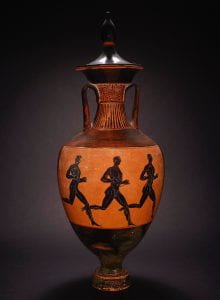12 June 2024, from 5pm
POSTPONED DUE TO UNAVOIDABLE CIRCUMSTANCES
A new date will be announced as soon as possible
Programme (will be published in due course)
Register to attend (registrations will open in due course)

A creative & critical soirée, jointly organised by the Centre for Comparative Literature and the Goldsmiths Writers’ Centre.
The evening will start with a talk on ‘Olympoesis: Revisiting Public Poetry at the 2012 London Games’ by Dr Michael Simpson, Distinguished Visiting Research Fellow at the CCL, and will be followed by readings and/or performances of creative writing, in poetry or prose.
The Olympic and Paralympic Games may have a claim to be the greatest show on earth. Geographically global and historically ancient and modern, they move from city to city and divide time into determinate intervals. As theatre, they are amphitheatrical, encompassing track and field, gymnastics and team sports, and much more; and they figure powerfully in international and national media. The plots are compelling and instantly scrutable: phenomenal performance and intense competition issue into sweet victories and gnawing defeats, often in photo-finishes. But there is also an imposing cultural dimension, beyond the sports and excitable commentary on them: the ancient Olympics included orations and readings, while the modern Games involve a Cultural Olympiad, or festival, which the host nation of the next summer Games initiates and promotes for four years before those Games themselves. Each Cultural Olympiad duly takes some of its characteristic tone and theme from the cultural life of the host nation.
As Paris now equals London in becoming the only other city to have hosted the modern Games three times, collective memories of the 2012 Games in London may be recalled, and clarified. That Olympiad, and the Games concluding it in 2012, was characterised, perhaps above all, by poetry: Simon Armitage organised an international ‘Poetry Parnassus’, launching it with a ‘poetry bombing’, by helicopter, of the South Bank; Danny Boyle’s opening ceremony for the Games featured Kenneth Branagh reciting Shakespeare; and numerous poems by eminent poets past and present, such as Tennyson, Carol Ann Duffy, and Lemn Sissay, were installed in the Olympic Park at Stratford, where they still stand.
In a sense, this Cultural Olympiad was picking up a poetic tradition associated with the Olympics ancient and modern, ranging from Pindar’s odes to the poetry competitions of the modern Games in the early twentieth century. Diverse and highly intermittent as this ‘tradition’ may be, it is a significant part of the cultural dimension of the Games. Yet such proximity does not mean that this poetry only idealises the Games and related official values, such as peace through sport; rather, this poetry can also articulate economic and political realities underlying such ideals as competition and level playing fields. So, where will the next poetic, creative instalments originate?
The event will be in person.
For any inquiries, contact CCL@gold.ac.uk – please include the word “Olympoetics” in the subject line.
